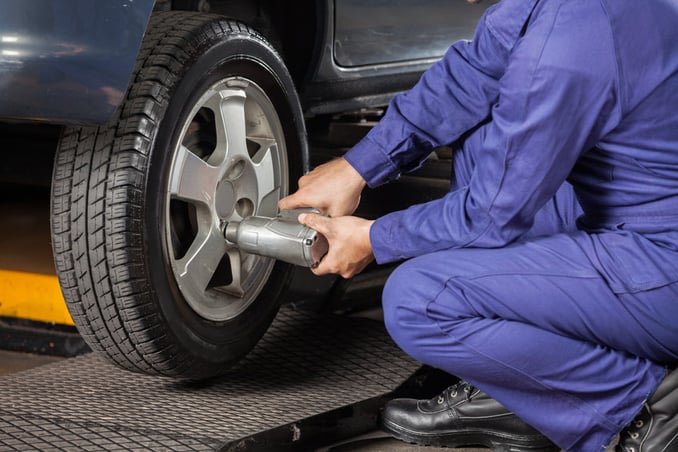Boost Your Drive: Top-Notch GMC Tires Service at Morris Tires
Wiki Article
Tire Service: The Impact of Weather
When it comes to guaranteeing ideal efficiency and safety and security on the road, understanding the influence of weather problems on tire service is essential. GMC Tire Service. In this conversation, we will discover the elaborate partnership in between weather problems and tire solution, dropping light on the significance of weather-specific tire upkeep practices and factors to consider.Warm and Tire Efficiency
When subjected to high temperatures, tires experience modifications in efficiency that can substantially impact automobile security and handling. The warmth created from prolonged driving or heat problems creates the tire rubber to soften, causing reduced walk life and raised wear. As the rubber becomes softer, the tire's grip on the road lessens, affecting braking distances and total grip. In extreme situations, extreme warmth can even trigger tire blowouts, posturing a severe security danger to the vehicle and its passengers.
Winter Impacts
Winter problems can have a substantial impact on tire efficiency and security. As temperatures decline, tire rubber can solidify, resulting in lowered grip on icy or snow-covered roads. In winter, tires may additionally lose atmospheric pressure a lot more rapidly, which can influence managing and gas effectiveness. Additionally, cool temperatures can create tire sidewalls to stiffen, raising the danger of damages from potholes or various other road risks.To minimize the results of cold weather on tires, it is vital to regularly examine tire stress and inflate them to the maker's advised levels. Making use of winter months or all-season tires developed for cold weather condition problems can also enhance grip and hold on icy or snowy roads. Appropriate tire maintenance, consisting of routine examinations for wear and damage, comes to be a lot more crucial during cooler months to guarantee optimal efficiency and security.
Rainy Issues Influence
Tires with damaged footsteps are more prone to hydroplaning, where a layer of water builds up between the tire and the roadway surface area, leading to loss of traction. To combat this, drivers need to regularly evaluate their tires for appropriate walk depth and consider spending in tires especially made for damp problems.In addition, stormy climate can likewise lower exposure, making it challenging for chauffeurs to see the road in advance plainly (GMC Tire Service). In such problems, it is important to readjust driving speeds as necessary and preserve a secure following distance to permit unexpected stops. Effectively inflated tires can additionally help in maintaining control on damp roads by supplying better handling and grasp
Snow and Tire Safety
Snow-covered roadways pose one-of-a-kind difficulties for drivers, stressing the significance of correct tire choice and maintenance. When driving in snowy problems, having the right tires can make a substantial difference in safety and efficiency. Wintertime tires are developed with unique rubber substances and tread patterns to offer far better traction on snow and ice compared to all-season tires. The much deeper treads and sipes of winter months tires help hold the roadway much better, decreasing the danger of sliding and sliding.
It is important to adhere to supplier guidelines when using and installing tire chains to prevent damages to the tires and automobile. By choosing the right tires, keeping appropriate inflation, and considering added grip aids like tire chains, chauffeurs can enhance their safety and security when browsing snow-covered roadways.
Weather-Related Tire Maintenance
When confronted with numerous climate condition, appropriate tire upkeep ends up being an essential facet of car safety and efficiency. Weather-related tire maintenance includes a series of practices targeted at ensuring ideal tire function and durability in different climate circumstances. One crucial aspect of weather-related tire upkeep is tire pressure guideline. Fluctuating temperatures can trigger tire stress to vary, influencing traction and gas efficiency. Routinely changing and inspecting tire pressure according to supplier recommendations is necessary for safe driving in altering weather. Additionally, tire walk deepness plays a substantial duty in handling different weather condition components. Tires with ample tread depth offer far better grasp on wet or icy roads, lowering the risk of hydroplaning or skidding. Evaluating tire step on a regular basis and changing tires when step wear gets to a certain deepness is essential for maintaining traction and stability in negative climate. By prioritizing weather-related tire maintenance, vehicle drivers can improve security, improve vehicle efficiency, gmc tires and lengthen the life expectancy of their tires.
Verdict
In final thought, climate conditions have a considerable effect on tire efficiency and security. From warmth impacting tire pressure and use to chilly weather condition decreasing traction, it is vital to take into consideration the weather when preserving and using tires.In this discussion, we will certainly explore the detailed connection in between climate problems and tire service, shedding light on the value of weather-specific tire upkeep practices and considerations.

Report this wiki page